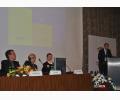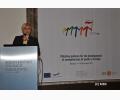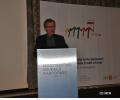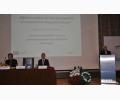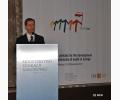Effective policies for the development of competencies of youth in Europe
- Published on Tuesday, 06 December 2011 02:40
"The potential of young people is primarily the potential of their competences and qualifications. In the interest of Europe's future, the future of us all, their competences development policy must be effective," said Lilla Jaron, Deputy Minister of National Education, opening today (16 November) the international conference, "Effective policies for the development competencies of youth in Europe." A three-day conference, organized by the Ministry of Education, the European Commission and the Educational Research Institute, carried out under The Polish Presidency of the Council of the European Union.
 effective-policies-conference-s copy
effective-policies-conference-s copy
Lilla Jaron expressed the hope that during the conference many important issues will be discussed, such as drawing on the experience of the countries in which significant progress concerning the competencies of youth has been observed and methods of teaching the competencies to better prepare young people for the challenges of adult life, including the entry into the labour market.
Pierre Mairesse, Director of the Directorate-General for Education and Culture of the European Commission, pointed out that one of the key tasks currently facing the European Union is to invest in the development of key competencies of young people, including the teaching of foreign languages. "On behalf of the Commissioner, Androulla Vassiliou, I would like to thank the Polish presidency for the steps taken to disseminate knowledge of languages in Europe," he said.
On the first day of the conference the results of two new Eurydice reports were presented. The reports include the data from 31 countries - all EU Member States plus Iceland, Liechtenstein, Norway and Turkey.
The first report investigates the organization of science teaching in Europe and provides an overview of existing policies and strategies that are designed to support science teaching. The report argues that although in general, students are taught natural sciences separately (as biology, chemistry and physics), in many countries, the links between these subjects are given considerable attention. The authors claim that engaging students in environmental protection and showing them possible applications of natural sciences in everyday life may be critically important for awakening students' interests, which, in future, will shape their decisions concerning the course of their study and work.
The second report discusses the issues of mathematical education in Europe. It underlines the fact that in recent years, most European countries have modernized mathematics curricula, with particular emphasis on the development of competencies and skills rather than theoretical content. This new approach concerns, among others, teaching methods through which students' understand the application and usefulness of mathematics in the real world. The report also notes that the present challenge is to ensure the necessary support and training opportunities for mathematics teachers. One of the particularly positive recent developments is the growth of teacher collaboration and exchange of best practices through online platforms, social networking and other online tools.
Over 200 people are attending the three-day conference (16 - 18 November). The guests include experts from research institutes, international organizations and representatives of education ministries of EU Member States, who are not only presenting the results of the national and international studies but sharing the experiences of their countries. The participants of the conference can also learn about the educational results of Member States', their experiences and competences development programs to support young people. The discussions in plenary sessions and panels concern, among others, the directions of further cooperation.
(source: Ministry of National Education)





